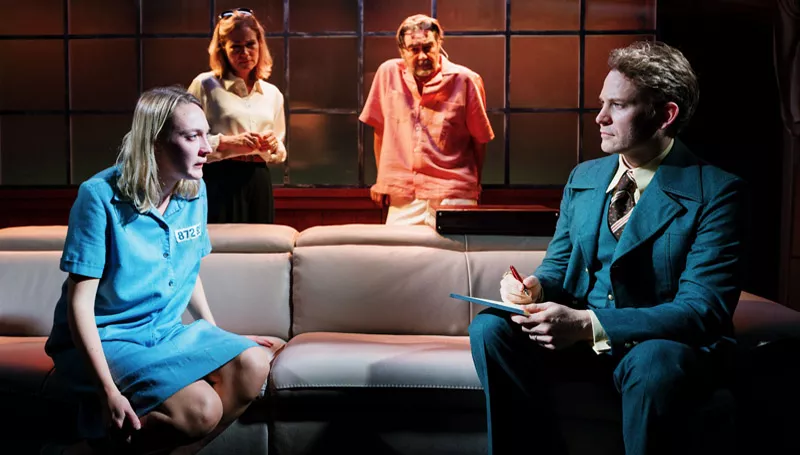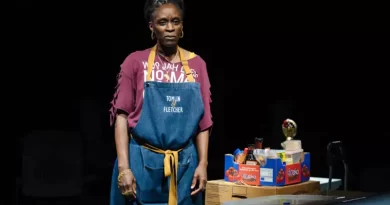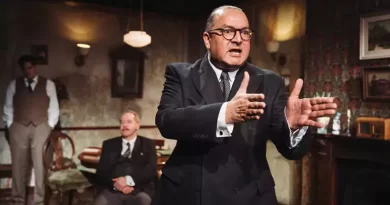“Ragdoll” at Jermyn Street Theatre
Neil Dowden in the West End
★★★☆☆
20 October 2025
Jermyn Street Theatre deservedly had a big hit in 2023 with Katherine Moar’s outstanding debut Farm Hall, which went on tour then transferred to Theatre Royal Haymarket in the West End. While that play dramatized the extraordinary true story of the bugging of captured German nuclear scientists in a British stately home at the end of the Second World War, Moar’s follow-up at Jermyn Street, Ragdoll, takes a fascinating new angle on a more recent slice of history that has provoked much contentious debate.
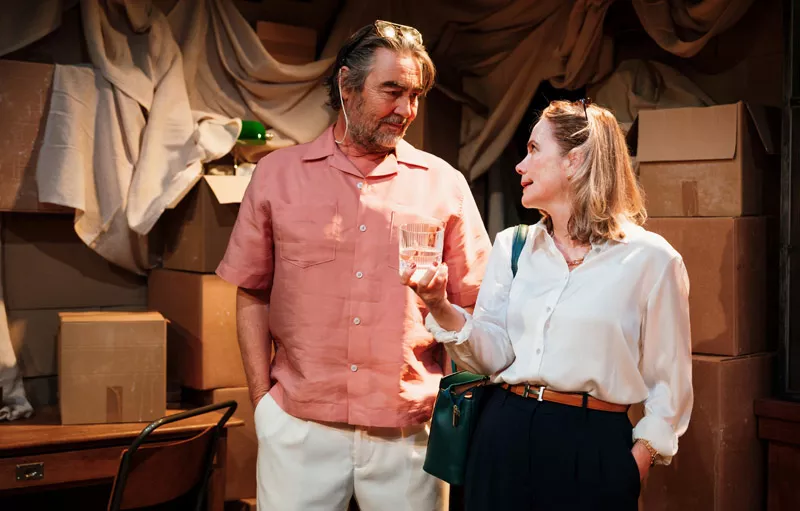
Nathaniel Parker and Abigail Cruttenden.
Photo credit: Alex Brenner.
Ragdoll is based on the infamous trial in the seventies of American heiress Patty Hearst, who was convicted of taking part in the crimes of a terrorist group even though they had kidnapped her. Moar focuses on the relationship between her and her lawyer (F. Lee Bailey), but refracted through the lens of an imagined meeting 40 years later. In contrast to Farm Hall, this moves away from historical realism towards speculative drama with the two timelines thrillingly merging near the end.
We begin in 2017 – significantly the year that the Me Too movement went viral – at the luxury Californian home of lawyer Robert who is visited by his former client Holly. (They are clearly based on the late Bailey and the now 71-year-old Hearst with their names changed not so much for legal reasons as for dramatic licence.) In role reversal, Robert now needs Holly’s help as he wants her to act as a referee since his professional reputation is on the line after being accused of a past (unspecified) sexual misdemeanour. But it becomes clear that she is still angry with him for letting her down in her trial and then ghosting her, as their younger selves appear to bring to life the momentous events that first brought them together.
The play doesn’t re-tread the well-worn path of debating Hearst’s innocence or guilt. Without resorting to historical exposition, we hear that as a 19-year-old student in California she was kidnapped by the far left Symbionese Liberation Army, and later took part in their armed robberies while having a sexual relationship with one of the men – though she claimed she was repeatedly raped and forced to do their bidding. Due to this “Stockholm Syndrome” her sentence was commuted by President Carter and she was eventually pardoned by President Clinton in 2001.
But Ragdoll zones in on the intimate and intense relations between Holly and Robert – or as their younger versions are (rather confusingly) called “The Heiress” and “The Lawyer” – as they agree that “this is about you and me”. He is already a celebrity criminal defence attorney – defending the likes of the so-called Boston Strangler and the captain accused of the My Lai massacre in the Vietnam War, and later O.J. Simpson – before being hired by her family to take on her case. It is implied that he is motivated by personal ambition, and that he is distracted by appearing on TV chat shows and hobnobbing with Hollywood stars, while he botches his closing argument due to a hangover. It’s also suggested that she becomes emotionally dependent on him and feels abandoned when he doesn’t answer her phone calls.
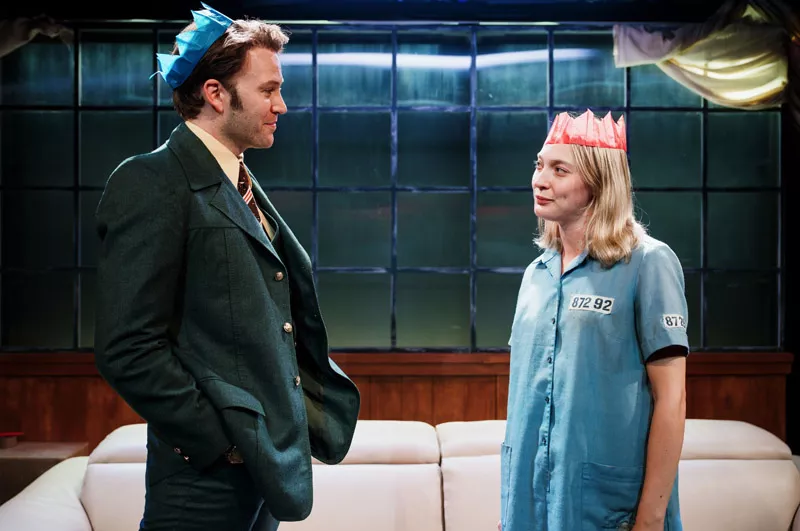
Ben Lamb and Katie Matsell.
Photo credit: Alex Brenner.
It’s a fascinating account of how professional and personal relationships overlap and turn bitter, but also how the dynamic between the protagonists shifts so that while Holly has moved on with her life Robert’s past catches up with him. She may have come from a privileged family background, but he oozes male entitlement. Moar seems to be linking the toxic masculinity that Hearst suffered in captivity with the past examples of sexual abuse uncovered by Me Too, of which Robert is apparently guilty.
But this connection does feel somewhat contrived, especially as the lawyer Bailey was not implicated in this – his later actual disbarment was due to withholding a convicted client’s assets from a court (which is indeed referenced in the play). Another anomaly with the historical record is that here the trial takes place in 1978, but it actually happened in 1976. Moar is evidently keen not to be tied too closely to historical fact, but because precise details about the characters parallel their real-life counterparts – including mention of Orson Welles’s film Citizen Kane modelled on Patty’s tycoon grandfather William Randolph Hearst – Ragdoll falls between two stools though it makes engaging drama.
The most exciting moment in Josh Seymour’s excellent production is when Holly and Robert, who often remain on stage as their younger characters come to life through memory, actually interact with them so that time and place dissolve as all four actors address each other. Ceci Calf’s design foregrounds the modern domestic setting without much suggestion of a jail in the past. It is dominated by a large cream couch, which Robert has bought for $50,000 and claims is unique, but it cannot be cleaned so it’s underused as he’s terrified of it getting dirty – a symbol of his sterile materialism – as well as cardboard boxes and dust sheets indicating his forthcoming move as he is forced to downsize.
The performances are first-rate. Abigail Cruttenden captures Holly’s slow-burning anger as she critically sees Robert for what he is and with new-found confidence is able to put her past life in context. Nathaniel Parker conveys Robert’s self-centred lack of awareness, but with his arrogance in what he has achieved in his career now undermined by desperation to clear his name. Katie Matsell gives The Heiress a provocative wilfulness mixed with edgy vulnerability. And Ben Lamb plays The Lawyer with the smooth cockiness of a man who is just intent on winning fame and fortune regardless of ethics or empathy.

